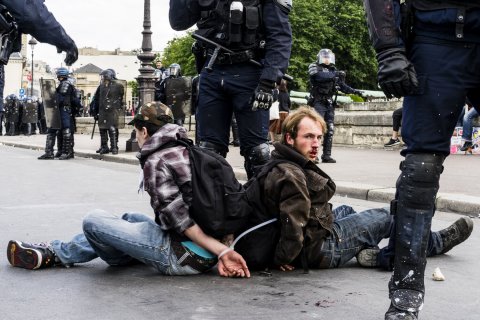About us
The Contesting Governance platform applies critical perspectives to unravel how power is constituted, and how it operates across particular institutional and societal fields. With its research, the platform hopes to provide more knowledge for understanding the conditions that create, safeguard or endanger open societies. Contesting Governance brings together researchers from across Utrecht University who share a profound interest in the critical and interdisciplinary exploration of themes at the crossroads of conflict & security, institutions, and human rights. The group aims to expand its reach and seeks to connect with other researchers who want to push the boundaries of contemporary research on governance, institutions, rights and security.
Meet the Contesting Governance Platform

Our research focus
Landscapes of power and order are changing across the globe. These changes affect not only traditional state structures and institutions, but also people’s claims to citizenship and participation. Authoritarian regimes have tightened their grip over the past decade, or have made a come-back, at times through military coups. Relatively new authoritarian regimes have extended their crackdowns – Turkey and the Philippines are a few examples – and troubling signs continue to arise in long-settled democracies like the United States and much of Europe (‘post-democracy’). At the same time, non-state actors – including multinational corporations, rebel groups, criminal organizations, and civil society more generally – are increasingly taking up governance roles.
Challenging existing power structures
Governance, in all its shapes and sizes, is increasingly contested. People are mobilizing to challenge existing political and socio-economic power structures. From Hong Kong and La Paz, to Paris and Bagdad, people are demanding transparent, accountable, and legitimate forms of governance to be created or to be protected against deliberate weakening by some governments.
Sometimes contestation can lead to more open societies and stronger institutions, while in other instances it may endanger them
People have for example tried to set up more accountable mechanisms of governance themselves, thus contributing to open societies, or they have protested against state corruption, abuse of power or attacks on the judiciary or civil society. Other groups have, by contrast, endeavoured to set up their own parallel power structures that are exclusive and oppress minorities. Some groups use existing formal institutions such as courts to contest existing power and to claim rights. Others take to the streets, peacefully or violently, thereby creating alternative informal venues of contestation.
Towards a better understanding of open societies
These examples go to show that sometimes such contestation can lead to more open societies and stronger institutions, while in other instances it may endanger them. This is exactly why it is crucial to study such contestations in order to better understand conditions for creating, safeguarding or endangering open societies.
With this critical and interdisciplinary exploration of themes relating to institutions, conflict & security, and human rights Contesting Governance connects two dynamic research networks of Utrecht University: the strategic theme Institutions for Open Societies and the Centre for Global Challenges.

